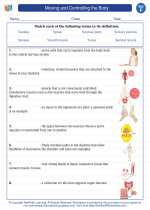Viruses
Viruses are microscopic infectious agents that can only replicate inside the living cells of an organism. They are not considered living organisms because they lack the characteristics of life such as metabolism and the ability to grow and respond to the environment.
Structure of Viruses
Viruses consist of genetic material, either DNA or RNA, surrounded by a protein coat called a capsid. Some viruses also have a lipid envelope derived from the host cell's membrane. The genetic material contains the instructions for the virus to replicate and infect host cells.
Life Cycle of Viruses
The life cycle of a virus involves several stages:
- Attachment: The virus attaches to a specific receptor on the surface of the host cell.
- Penetration: The virus injects its genetic material into the host cell or is taken up by the cell.
- Replication: The viral genetic material takes over the host cell's machinery to replicate and produce new viral components.
- Assembly: New viral particles are assembled from the replicated components.
- Release: The newly formed viruses are released from the host cell, often causing the cell to burst.
Effects of Viruses
Viruses can cause a variety of effects on their host organisms, including:
- Disease: Many viral infections can lead to diseases such as the common cold, flu, AIDS, and COVID-19.
- Cellular Damage: Some viruses can directly damage the cells they infect.
- Cancer: Certain viruses are associated with the development of cancer in humans and other animals.
Preventing Viral Infections
Preventing viral infections involves measures such as:
- Vaccination: Vaccines can help prevent certain viral infections by stimulating the immune system to recognize and fight the virus.
- Hygiene: Practicing good hygiene, such as handwashing, can reduce the spread of viruses.
- Antiviral Medications: Some antiviral medications can help treat viral infections and reduce their severity.
Study Guide
Here are some key points to remember about viruses:
- What are the components of a virus?
- Describe the life cycle of a virus.
- How do viruses affect their host organisms?
- What are some measures for preventing viral infections?
Understanding the structure, life cycle, and effects of viruses is important for understanding infectious diseases and the development of treatments and vaccines.
.◂Science Worksheets and Study Guides Sixth Grade. Moving and Controlling the Body
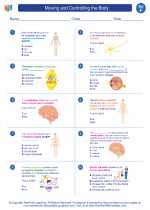
 Worksheet/Answer key
Worksheet/Answer key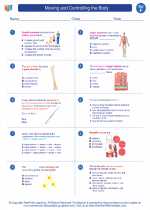
 Worksheet/Answer key
Worksheet/Answer key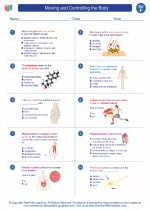
 Vocabulary/Answer key
Vocabulary/Answer key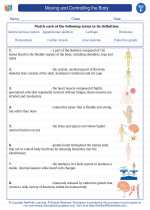
 Vocabulary/Answer key
Vocabulary/Answer key
 Vocabulary/Answer key
Vocabulary/Answer key